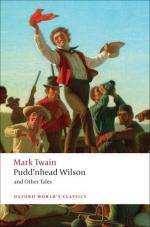We did not dress our public functionaries in undistinguished raiment before Franklin’s time; and the change would not have come if he had been an obscurity. But he was such a colossal figure in the world that whatever he did of an unusual nature attracted the world’s attention, and became a precedent. In the case of clothes, the next representative after him, and the next, had to imitate it. After that, the thing was custom; and custom is a petrifaction: nothing but dynamite can dislodge it for a century. We imagine that our queer official costumery was deliberately devised to symbolise our Republican Simplicity—a quality which we have never possessed, and are too old to acquire now, if we had any use for it or any leaning toward it. But it is not so; there was nothing deliberate about it; it grew naturally and heedlessly out of the precedent set by Franklin.
If it had been an intentional thing, and based upon a principle, it would not have stopped where it did: we should have applied it further. Instead of clothing our admirals and generals, for courts-martial and other public functions, in superb dress uniforms blazing with colour and gold, the Government would put them in swallow-tails and white cravats, and make them look like ambassadors and lackeys. If I am wrong in making Franklin the father of our curious official clothes, it is no matter—he will be able to stand it.
It is my opinion—and I make no charge for the suggestion—that, whenever we appoint an ambassador or a minister, we ought to confer upon him the temporary rank of admiral or general, and allow him to wear the corresponding uniform at public functions in foreign countries. I would recommend this for the reason that it is not consonant with the dignity of the United States of America that her representative should appear upon occasions of state in a dress which makes him glaringly conspicuous; and that is what his present undertaker-outfit does when it appears, with its dismal smudge, in the midst of the butterfly splendours of a Continental court. It is a most trying position for a shy man, a modest man, a man accustomed to being like other people. He is the most striking figure present; there is no hiding from the multitudinous eyes. It would be funny, if it were not such a cruel spectacle, to see the hunted creature in his solemn sables scuffling around in that sea of vivid colour, like a mislaid Presbyterian in perdition. We are all aware that our representative’s dress should not compel too much attention; for anybody but an Indian chief knows that that is a vulgarity. I am saying these things in the interest of our national pride and dignity. Our representative is the flag. He is the Republic. He is the United States of America. And when these embodiments pass by, we do not want them scoffed at; we desire that people shall be obliged to concede that they are worthily clothed, and politely.




